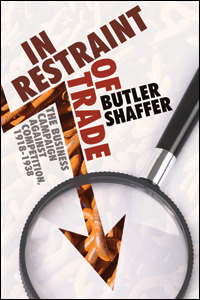
In Restraint of Trade
If you ever thought that the battle for free enterprise was about business versus government, this book will change the way you understand the essential struggle. The evidence is vast that big business cooperated closely with big government in building the essential architecture of the mixed economy.
This extremely important study by Butler Shaffer — economist and professor of law — makes a deep inquiry into the attitudes of business leaders toward competition during the years 1918 through 1938. What Shaffer finds is a business sector not only hostile to free markets but aggressively in favor of restrictions that would protect their interests. This, he finds, is the very source of the origins and development of the regulatory state.
During this period, businesses forged a consensus about the scope and intensity of competition that they would tolerate. They began to favor collectivist authority over one another via government-backed enforcement agencies.
Free and unrestrained competition required more of them than they were willing to tolerate. It required constant innovation, a fight against falling prices, a continued effort to seek out new markets, and the willingness to subject their bottom line to consumer preferences for lower prices and better products. They saw the vibrancy of free enterprise as a threat to their firms and well-being, so they used antibusiness sentiment in politics to hamper the market in ways that would benefit them.
Shaffer’s analysis of the New Deal confirms what John T. Flynn wrote — that the New Deal was not so much antibusiness as pro-established business. His detail is especially impressive in dealing with the steel cartel and the natural-resource monopolies.
What Shaffer has uncovered represents a serious challenge to both left-wing perceptions and right-wing caricatures. It also underscores the extent to which the true spirit of free enterprise must insist on a principled attachment to liberty and not merely promote one sector or interest group over another.
This book should enter into the canon of required economic history.

